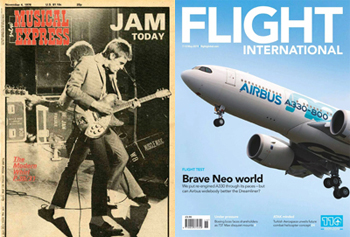
On the front line
If we needed confirmation that some jobs in publishing are more dangerous than others, it came with the tragic death of 29-year-old journalist Lyra McKee in April. Lyra had been reporting on rioting in the Creggan area of Londonderry.
Michelle Stanistreet, NUJ general secretary: “The killing of a journalist in these circumstances is deeply shocking. To wake up to this news on Good Friday morning is disturbing and profoundly saddening. A young, vibrant life has been destroyed in a senseless act of violence.”
To add extra poignancy, Lyra had been due to speak a few days later at an event to mark World Press Freedom Day hosted by Amnesty International in Belfast. It was to be a panel discussion following a showing of the film on the life of murdered journalist Marie Colvin.
Later in May, Lyra was posthumously awarded the Journalists’ Charity Award at the Regional Press Awards. Society of Editors executive director Ian Murray said the award for Lyra recognised her achievements during her short career, but also highlighted the risks that journalists even at local level take in bringing news to their communities.

Law of unintended consequences
Everyone agrees that it would be desirable if young people were not exposed to harmful material online or put in a position where their personal data could be exploited by unscrupulous people.
Two framework documents aimed at protecting young people from those online threats are currently winding their way through the system – the Online Harms White Paper and the ICO’s Age Appropriate Code Consultation. Both are getting the Society of Editors and the News Media Association extremely agitated.
Launching the White Paper, culture secretary Jeremy Wright said the government was interested in, “user-generated content where there is no other control of that behaviour. The activities of newspapers and broadcasters are already regulated.” In a subsequent letter to the Society of Editors, he added: “Journalistic or editorial content will not be affected by the regulatory framework.”
His reassurances have not been reassuring.
The NMA warned that the proposals pose “profound dangers to press freedom” because, as currently drafted, national and local news publishers would fall within the scope of the new regime.
The SoE added: “The Society is particularly concerned where the proposed law attempts to prevent disinformation and fake news. Who will decide what is disinformation? It does not take too much imagination to see the eventual creation of some sort of Orwellian ‘Department of Truth’ emerging from a badly-thought through piece of legislation, no matter how well meaning.”
Writing to the Information Commissioner’s Office (ICO), the SoE said proposals to ensure news websites are age appropriate risk doing untold harm to legitimate media companies, even forcing some regional titles to fold.
“Not only are these proposals a real threat to the financial future of media companies, they also fly in the face of other endeavours to encourage young people to engage with the world around them and play a part in their future.”
The ICO’s proposals, if enacted, would require news websites to either ensure their content is suitable to be read by children or require users to prove they are adults, says the Society.
“In either eventuality, the media industry online would be severely harmed,” said Ian Murray. “Making news content child-friendly will inevitably mean watering it down substantially, while asking users to provide proof of age would see a huge loss of readers.”
“While no one wishes to see children and young people exploited, there appears to be no evidence this is actually the case with media websites. Yet now the industry is faced with potentially catastrophic harm in an attempt to remove an unrecorded threat.”
Sustainability
This period saw a number of prominent publishers announce their plans to stop using polywrap.
The Times and The Sunday Times have now removed all outer polybagging from copies sold via supermarkets, independent retailers and home news delivery.
In May, say the publishers, the outer polywrapping from 118,000 copies of The Sunday Times supplied to supermarket stores was removed helping supermarkets take 35 tonnes of plastic out of their retail supply chain.
On 31 May, The TLS switched polybagging for postal subscriptions to compostable film and in the first week of June, the outer wrapping of all home news delivery copies of The Times and The Sunday Times was changed to biodegradable wrapping made from potato starch.
The new environmentally friendly wrapping can be disposed of in home compost heaps, garden waste bins and food waste bins.
The moves are part of News UK’s plastics pledge to remove all single-use plastic used to wrap its titles and inner magazines by 2020.
The Guardian is also going down the potato starch route and has announced that copies of Guardian Weekly will soon come in a compostable material replacing the current polythene wrapping.
Beginning in the UK, the current international rollout excludes Australia and New Zealand, where options are still being explored. Copies of Guardian Weekly in the US and Canada arrive in the post unwrapped.
The news follows on from the Guardian’s announcement earlier this year to package its Saturday supplements in a compostable wrap to help reduce plastic waste.
Mylene Sylvestre, director of publishing: “It was wonderful to see such a positive response from readers after the introduction of compostable wrapping for our Saturday paper and I am proud that we can now look to extend this to Guardian Weekly subscribers in the UK and beyond.”
Immediate Media announced in May that they would be using paper wrapping for all BBC Countryfile and BBC Wildlife magazine subscribers' copies from their June issues onwards.
Marie Davies, managing director, specialist: “Having explored a number of alternatives to polywrap for some time, we are delighted to be able to introduce a paper-based solution, as a completely recyclable product has always been the preferred option.”
Paul McGuinness, editor of BBC Wildlife Magazine: “I couldn’t be happier that we’ve ditched plastic from BBC Wildlife Magazine. To change the way we package and distribute our magazines is a surprisingly complex undertaking, but a vital one.”
Welcome to the world of the circulation manager.
Environment – getting the words right
Whilst increasing numbers of publishers are taking practical steps to eliminate plastics from their distribution operations, the Guardian has also decided to change the way it talks about the subject, by updating its style guide.
The publisher has introduced terms that it thinks more accurately describe the environmental crises facing the world.
Instead of “climate change” the preferred terms are “climate emergency, crisis or breakdown” and “global heating” is favoured over “global warming”, although the original terms are not banned.
“We want to ensure that we are being scientifically precise, while also communicating clearly with readers on this very important issue,” said editor-in-chief, Katharine Viner. “The phrase ‘climate change’, for example, sounds rather passive and gentle when what scientists are talking about is a catastrophe for humanity.”
“Increasingly, climate scientists and organisations from the UN to the Met Office are changing their terminology, and using stronger language to describe the situation we’re in.”
The update to the Guardian’s style guide follows the addition of the global carbon dioxide level to the Guardian’s daily weather pages in April this year.
This will be music to the ears of environmental campaigners, who have been infuriated by what they see as occasional false equivalence reporting on the BBC where lone voice climate-change-deniers have been given considerable airtime, in spite of the fact that their views are contrary to the overwhelming weight of scientific opinion.

No sacred cows
There’s now even less room for sentiment in today’s publishing world than there was before. If a brand, however iconic, is deemed non-core, then they will be offloaded tout de suite.
Founded in 1909, Flight International, the world’s longest continuously published aviation magazine, was recently sold by RBI to DVV Media International (DVV). The portfolio includes the magazine brands Flight International and Airline Business, along with associated websites, newsletters and events.
The portfolio will join DVV’s Air Cargo News brand to substantially increase DVV’s offering to the aviation sector.
“This is a significant step forward for our organisation,” said Andy Salter, MD of DVV, “The new portfolio means we now have a comprehensive offering across all modes of the transport and logistics business information sector. We are all looking forward to working with the new team to build on the legacy of these products and develop a thriving market offering.”
It looks like Mark Allen Group and Metropolis now have some serious competition in the acquisitions space. Sutton-based DVV, owned by German newspaper publisher Rheinische Post, has acquired a number of other RBI businesses, such as Personnel Today, Railway Gazette International, Commercial Motor and Motor Transport and also recently bought Centaur’s HR portfolio. A company clearly in a hurry.
NME, having launched in 1952, might not be as old as Flight International but it is a mega brand, even if somewhat diminished by the dropping of its print edition last year.
TI Media has sold it, along with Uncut to BandLab Technologies. The deal includes the brands’ social, digital, print and experiential assets.
Singapore-based BandLab Technologies has pioneered a rapidly expanding social music creation platform and is acquiring NME and Uncut as part of its mission to grow out a major global music media business, says TI Media.
Marcus Rich, CEO, TI Media: “NME and Uncut, will always have a special place in our story. Their reputation for stand-out, award-winning journalism spanning seven decades goes well beyond the world of music and I’m proud they’ve attained that status as part of our company.”
“At the same time, we need to recognise that to achieve the next stage of their evolution, NME and Uncut will be better placed with a business that has music at its heart. Under BandLab Technologies’ ambitious ownership and direction, I’m confident both of these truly iconic brands will thrive.”
Meng Kuok, founder and CEO of BandLab Technologies: “These brands occupy a treasured place in the UK music landscape and increasing relevance to the global music scene, which we are looking to enhance and extend. These two media brands will play an important role in continuing our vision to create a connected world of music.”
A bold ambition that’ll hopefully be realised, meaning many more years of publishing success for a brand that was selling over 300k copies in 1964 at the height of Beatlemania.
This article was first published in InPublishing magazine. If you would like to be added to the free mailing list, please register here.










